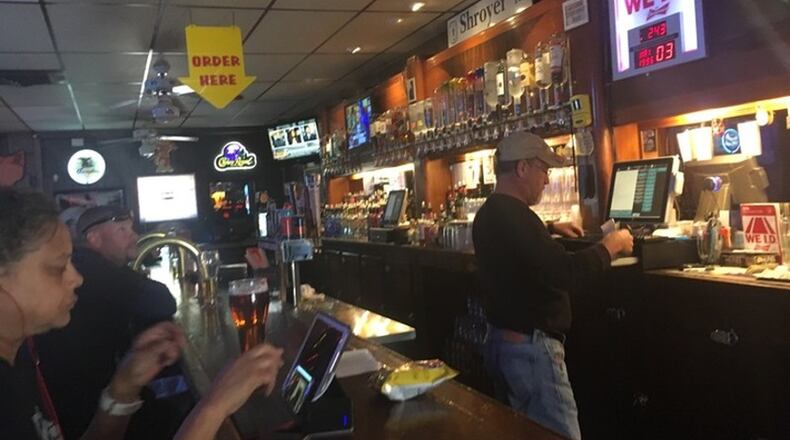The jump indicates local law enforcement agencies are contributing to the initiative designed to deter bars, bartenders and private individuals from letting their guests drink too much alcohol.
Trace-back investigations are still unknown to many people outside the law enforcement world.
“I think its slowly starting to trickle out to the public,” Adam Johnson, lead agent for the unit’s southern district office, said.
MORE: State traces steps of drunks who cause accidents, deaths
After investigations, people who served the alcoholic beverages can face criminal charges, and businesses can face fines and liquor-license suspensions.
In 2018, 467 case referrals came from the state highway patrol or local law enforcement. That was 202 more than in all of 2017 and 211 more than in 2016, according to data provide by the state in response to public-information requests from the Daily News.
Last year, state agents who work within the Ohio Department of Public Safety— including six assigned specifically to handle these cases — investigated 208 of the referrals, 53 more than in 2017, according to the data.
In January 2018, the unit filed charges in a case referred to them by Cincinnati police involving a West Chester man and a Cincinnati restaurant-bar accused of serving six under-age customers who were later injured in an accident, according to a press release.
After a nine-month investigation, Blake A. Williams, 25, of West Chester, was charged with six counts of sale or furnishing intoxicating liquor to a person under 21.
Sushi Cafe World of Clifton, also known as Mr. Sushi, was charged administratively with furnishing intoxicating liquor to a person younger than 21.
Williams was placed on diversion in Cincinnati Municipal Court, according to court records. The business paid a $15,000 fine rather than serve a 30-day suspension, according to Sarah Creedon, executive director of the Ohio Liquor Control Commission.
MORE: Liquor license crackdown key to closing local strip clubs
Despite the costs and liabilities involved, the association representing the licensed establishments expressed support for trace-back investigations.
"From our perspective, bar owners and bartenders need to be cognizant they bear a responsibility to the public," said Andrew Herf, executive director of Ohio Licensed Beverage Association.
Like the state investigative unit, the beverage association offers classes on the law and regulations.
“They are selling a product, that if not consumed responsibly, can be very dangerous,” Herf said.
Dayton police referred a case stemming from a crash on Feb. 13, 2016, in which five people in two cars were killed on Interstate 75.
James H. Pohlabeln, 61, of Dayton, was southbound in northbound lanes, when he crashed into a car carrying Kyle Canter, 23, of New Carlisle; Earl Miller II, 27, of New Carlisle; Vashti Brown, 29, of Dayton; and Devin Bachmann, 26, of Huber Heights; according to the investigative unit report.
RELATED: Video update on 5-person fatal case
RELATED: Driver released from jail hours before deadly I-75 crash
Agents determined Canter, Miller, Brown and Bachmann were attending a birthday party at the Shroyer Inn.
The coroner’s report indicated all five victims were under the influence of alcohol. The bartenders told agents the four in the bar before the crash “had somebody with them that was driving that wasn’t drinking,” according to the investigative unit report.
One witness said one of the victims was falling asleep in the bar and two were so drunk, the other two came and picked them up.
On June 3, 2016, agents served the bar with a violation notice. The Ohio Liquor Control Commission ordered a 30-day suspension or a $5,000 fine, according to Sarah Creedon.
The bar appealed to the Franklin County Common Pleas Court. The court upheld the punishment. On Oct. 22, the 10th District Court of Appeals upheld its decision overturning the common pleas court's decision, according to court records. The case is now back for consideration in common pleas court.
The laws underlying the trace-back investigations have been in place for many years, but the heightened focus goes back about eight years when the Ohio Investigative Unit merged with the Ohio Highway Patrol, Johnson said.
In terms of the educational focus, Johnson compared the agents to DARE officers who educate school kids about alcohol and drugs. The unit also offers a high-school program, ‘The Sober Truth,” he said.
Typically the agents get referrals in cases involving under-age drivers, serious or fatal crashes.
While most cases end with lesser consequences, one Ashtabula County case ended with a felony conviction.
In December 2017, Tracie T. Pascoe of Geneva pleaded no contest to attempted involuntary manslaughter, as well as furnishing alcohol to under-age persons, a misdemeanor, according to court records.
Pascoe was placed on probation and ordered to do 150 hours of community service. She was also ordered to pay a $2,000 fine or a $500 fine to the county and $1,000 to a charity devoted to drunk-driving awareness.
Pascoe and two family members were charged after a 2015 house party after which Alexandria M. Struhar, 20, of Ashtabula, died in a crash.
Troopers or local police investigate the crashes but turn over the trace-backs to the investigative unit.
“We put together what led up to the crash,” Johnson said.
The investigations sometimes take months and often involve multiple interviews.
When available, video from the night of the incident is seized, along with receipts and reports indicating who was working.
In most cases, charges aren’t filed, state data shows.
Last year, from the 467 referrals just 22 administrative cases were filed against the establishments and 68 criminal charges filed against those accused of serving the alcoholic beverages.
Johnson said the state wants to prevent these crashes.
“We don’t want to have to be doing these investigations,” he said.
Number of fatal crashes in Ohio related to drivers under the influence of drugs or alcohol
2013 350
2014 375
2015 401
2016 430
2017 405
2018 375
About the Author

